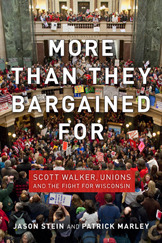What do you think?
Rate this book


328 pages, Kindle Edition
First published January 1, 2013
“In the long term, there was a clear advantage for the budgets of Milwaukee Country and the Milwaukee Public Schools, which faced problems funding retiree health care and pensions far in excess of the typical local government in Wisconsin…An actuary found that the district lowered its projected obligation to retirees by a whopping $1 billion, or 42 percent, between 2009 and 2011.”However, Walker did not keep another of his campaign pledges to the working poor. Walker cut the earned income tax credit by $40 million over two years and froze the homestead tax credit, which helps low-income homeowners and renters. Additionally, he cut aid to local governments by $1.25 billion because he refused to raise taxes while trying to balance the budget. But “…we are providing almost $1.5 billion in savings through our budget repair bill,” Walker explained. It's difficult to decide but Walker sounds like he is too thick to get it. Saving money that people need to live may not be productive.